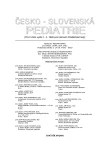-
Medical journals
- Career
Pneumococcal Infection in Children and Their Prevention
Authors: Z. Kuková; A. Kapellerová; Z. Košťálová
Authors‘ workplace: II. detská klinika LF UK a DFNsP, Bratislava prednosta prof. MUDr. L. Kovács, DrSc., MPH
Published in: Čes-slov Pediat 2005; 60 (5): 301-305.
Category: Comprehensive Report
Overview
The authors paid their attention to present possibilities in the prevention of pneumococcal infections by mean of vaccination in children at risk. Invasive pneumococcal infections significantly participate in mortality in children at risk even at the present time. The risk factors for the origin of invasive infections include the age below two years, anatomical or functional asplenia, immunodeficiency, and conditions after transplantation of organs and hemopoietic cells as well as basal chronic diseases of the patients.
The prevention can make use of the 23-valent polysaccharide vaccine (PSV23), which encompasses up to 90% serotypes of pneumococci responsible for invasive infections, but should be applied in children older than two years.
For the younger children there is a more suitable polysaccharide conjugated vaccine (PCV7), which decreases the occurrence of invasive infections, pneumonias, acute otitis and pneumococcus carriership. It is recommended by the Ministry of Health to be applied in children at risk for the age of two months up to two years. However, a whole scale prevention of pneumococcal infections in healthy children is presently not recommended.Key words:
pneumococcal infections, children, risk factors, vaccination
Labels
Neonatology Paediatrics General practitioner for children and adolescents
Article was published inCzech-Slovak Pediatrics

2005 Issue 5-
All articles in this issue
- Maternal Phenylketonuria (PKU) in the Moravian Region
- A Sudden Cardiac Death at the Child Age
- Long-term Follow-up after Liver Resection in Children
- Long-term Changes in the Growth of Czech Children Population
- Asthma in Children
- Failure of Vaccination against Haemophilus Influenzae Type b
- The Possibilities of Establishing Risk in Development of Premature Atherosclerosis by Imaging Methods at the Child Age
- Lung Sequestration
- Pneumococcal Infection in Children and Their Prevention
- Czech-Slovak Pediatrics
- Journal archive
- Current issue
- Online only
- About the journal
Most read in this issue- Lung Sequestration
- Maternal Phenylketonuria (PKU) in the Moravian Region
- Failure of Vaccination against Haemophilus Influenzae Type b
- A Sudden Cardiac Death at the Child Age
Login#ADS_BOTTOM_SCRIPTS#Forgotten passwordEnter the email address that you registered with. We will send you instructions on how to set a new password.
- Career

